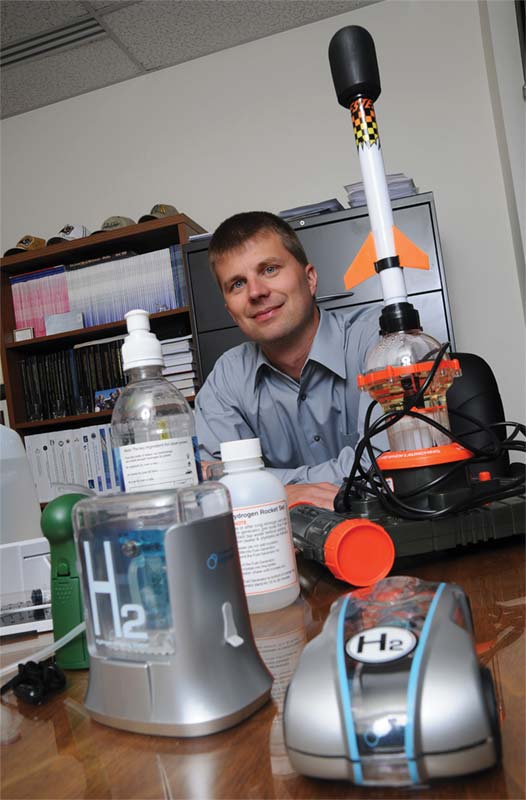Hydrogen: the hype and the hope
Posted by magazine
You probably won’t be able to drive down the highway in your own non-polluting vehicle that runs on hydrogen power any time soon. Nor will you be powering your whole house with hydrogen-based technology in the coming years. Someday soon, though, you might own a cell phone equipped with a hydrogen-powered fuel cell instead of a battery. The cell phone would come with an insert-ready hydrogen pack and a small solar array for charging.

You probably won’t be able to drive down the highway in your own non-polluting vehicle that runs on hydrogen power any time soon. Nor will you be powering your whole house with hydrogen-based technology in the coming years. Someday soon, though, you might own a cell phone equipped with a hydrogen-powered fuel cell instead of a battery. The cell phone would come with an insert-ready hydrogen pack and a small solar array for charging.
“We need to be realistic about what we can and can’t do with hydrogen right now,” says Scott Grasman, associate professor of engineering management. “In addition to some of the more Buck Rogers things that might happen in the future, we need to study some of the things we can do in the short term.”
Grasman is one of the lead researchers working on a Missouri S&T study called “Hydrogen Fuel Cell Analysis: Lessons Learned from Stationary Power Generation” for the U.S. Department of Energy. The technology necessary to produce hydrogen-powered vehicles that only emit water does exist, but those kinds of vehicles are not feasible for every day drivers right now, according to Grasman. The main drawback is cost. Grasman says vehicles that run totally on hydrogen fuel cell technology currently cost anywhere from $50,000 to $1 million.
Grasman’s group is looking at ways to use hydrogen for more economically feasible uses, such as energizing back-up power generators, forklifts, various types of military equipment and consumer electronic items, including cell phones. Working with Grasman on the DOE project are Fathi Dogan, professor of materials science and engineering; Umit Koylu, associate professor of mechanical and aerospace engineering; K.B. Lee, professor of chemical engineering; and John Sheffield, professor of mechanical and aerospace engineering.
Grasman has also played around with the idea of using hydrogen fuel cell technology in toys. In fact, he’s got a small hydrogen car and a toy hydrogen rocket in his office. He says these kinds of gadgets will help the public understand how hydrogen technology works.